
Review
Nova Antarctica: this indie game overpromises and underdelivers
by Debora Pape

Life simulator Pixelshire tempts you in with cute pixel art and the prospect of relaxed country life. But appearances turn out to be deceiving. What initially looks like a pleasant game soon turns into a frustrating tragedy.
My adventure begins with a dramatic bang: I’m shipwrecked and stranded in the harbour town of Pixelshire after a fire at sea. Friendly Captain Farrell gives us shelter, but there’s no in-depth story. Instead, I’m thrown straight in at the deep end – or rather, rushed along the dusty paths between villagers.
The first task takes me straight to mayor Eva with a compass from Captain Farrell. She in turn sends me to gardener Margarita to help her prepare a tomato soup for the captain. This is where the clumsy controls and sparse introduction to the game become apparent. At this point, it’s worth mentioning that Pixelshire is a full release game, so it shouldn’t have the markings of an early access title.
To make a simple tomato soup, you first have to buy seeds from Margarita – hidden in a shop you can only access by interacting with her. Then the seeds need to be planted and watered. I have to laboriously drag the pick and watering can from my inventory into the tool ring several times until it works. I manage to plant the seeds OK, but watering requires precision for the little plants. If I stand one pixel too far away, the water just pours next to it. And even though I tend to them, they’ve gone bad by the next day. I’m confused.
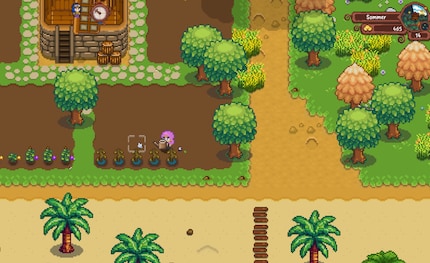
The fact that Margarita has finished the soup before the tomatoes have grown comes in handy. It takes a veritable orgy of clicking through a menu to hand the finished soup to Captain Farrell. The unnecessary complexity and confusing presentation of the data sheet turns a simple task into a tedious puzzle.
Later tasks also turn out to be stumbling blocks. Digging a six-inch hole for the captain proves to be unexpectedly time-consuming. Once it’s dug, I’m told I should now make it smaller. And add a hill, without any explanation how. After searching for a while, I find a selection menu for the tool at the bottom left in the form of three icons (excavate, dig, add ramp). Building a ramp for this is another action I need to do in order to complete the quest. For each of these steps, I have to wait until the captain asks me to do it, otherwise it doesn’t count. Unfortunately, I built a ramp before the captain’s instruction. So I have to dismantle and reassemble it.
When planting rice for Margarita, I’m a bit overzealous when I buy all the seeds, so there are none left for extra planting. As the task is only considered complete when I grow rice again, I have to abandon the current stage of the game, otherwise I just end up stuck. Ironically, Margarita no longer needs the rice to cook her pudding. Although the quest had implied she did. Handing the pudding over to Eva takes place in a straightforward conversation, unlike giving Captain Farrell his tomato soup.
The presentation of the game adds to the confusion. Tools look completely different in the game itself than in the tool ring. Not even the colours match. The wooden tools I get are brown, but in the tool ring, everything is grey. By the time I get the shovel, axe and pickaxe, it’s constant guesswork as the grey pixel tools look almost identical. The copper pick I get later on is the same grey in the tool ring as the wooden pick.
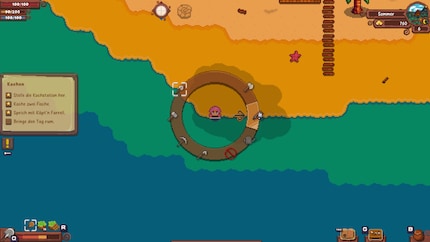
The captain initially said I’d be able to have his bed temporarily, but that turns out to be an empty promise. And without a bed, there’s no save function, a major setback. Only after I bring Eva her rice pudding does she reveal that there’s a guest room. I can finally save my progress in the game. Obviously, the next day begins with another conversation with Jack, Eva, Margarita and the captain. Jack said I was supposed to go to Margarita so she could teach me something, but she’s just cooking another rice meal for Eva.
The compass the captain gave me at the start also proves to be of little help when it comes to finding people in their homes. Instead of directions, it just shows a house icon and I have to guess the exact position. Fortunately, I work out where the houses are as time goes by.
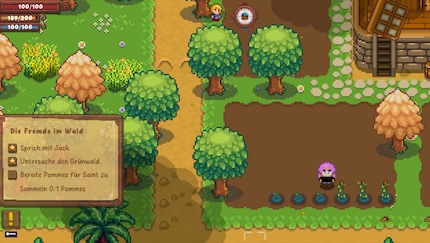
More of the game’s weaknesses become apparent when you build your first house. The furnace requires fuel, which I need to explicitly activate again after selecting it. Not only that, melting the likes of stone ore in the furnace takes time. Sometimes up to three minutes. At least I can do something else in the meantime and collect the ore later – but only one type at a time.
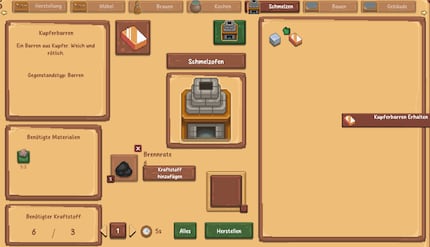
The anticipation for a first house of my own is suddenly dampened when it reminds me of an unfortunate cross between a sandcastle and a tent. The option of designing the interior with a custom-built chair and plant proves to be a farce. I can only position the chair to the left or right and can’t even sit on it. Meanwhile, the plant refuses to go in many apparently available places. Another somewhat annoying point is that I can’t dismantle incorrectly placed items without a hammer. They’re irretrievably lost when put in the open.
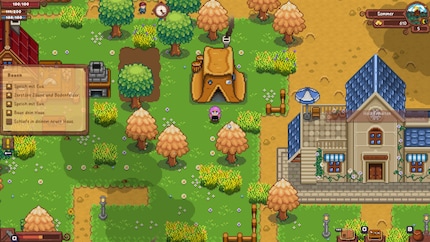
Fishing is often a relaxing mini-game in other life simulators, but in Pixelshire it’s a whole load of confused button-pushing. I can’t understand the instructions to start with because the buttons are the same colour. Later on, I find the game quite funny, even though it’s got nothing to do with fishing.
Meanwhile, felling trees doesn’t always work from every angle and makes my stamina bar disappear. This stamina meter only fills up fractionally after I’ve eaten, forcing me to go to sleep several times. However, the process of chopping wood takes an agonisingly long time, and I simply don’t enjoy it.
I can extract various metals from a nearby gold mine. It’s where I encounter my skill tree for the first time. Iron ore blocks access to a lower-lying location and I need certain skill points to clear it. Turns out that I need better tools and have to activate the experience points I’ve gained for them in the skill tree. I get the tools straight from the miner on site.
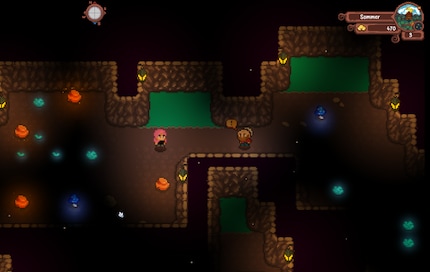
The skill tree is a confusing menu, while the logic behind quest rewards and skill development is largely unclear. I’m not told what I need to do to improve, just what has changed once I’ve progressed. Sometimes I have better gloves for fishing, other times a better grip for carrying ore.
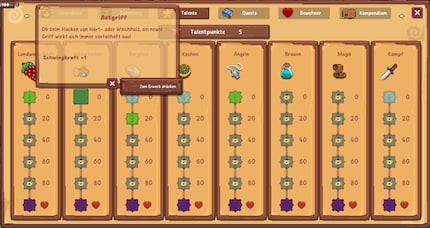
The skill levels are given in numbers, which suggests to me that in fishing, for instance, you need to catch a certain number of fish to improve your skill. But there’s no clear feedback. What’s more, I can’t unlock the wood skill with the number 20 even after felling 20 trees. At least I seem to be making progress in other areas and can unlock acquired skills at the touch of a button.
The supposedly exciting twist in the story turns out to be a tired joke. After a leisurely fishing session, I’m supposed to look for Jack who’s gone missing in the forest. At the same time, Eva mentions a missing warrior called Valerie. Conveniently, I find her right at the edge of the forest and she gives me a sword for future defence – in the same indistinguishable pixel style as all the other tools, of course. The fight against blue slimes leads to an encounter with a green goblin. I expect an exciting fight, but the goblin flees straight into a building. I then collect Jack and take him back to the city without further incident. The tension I was hoping for doesn’t materialise.
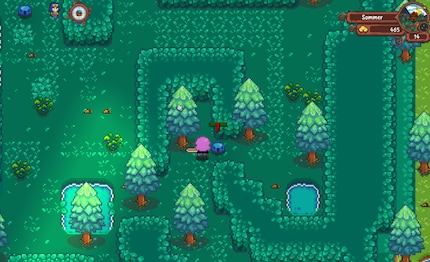
To make matters worse, the background music isn’t consistently mixed. There are random track changes and a door slamming somewhere all the time, no matter how far away I am from a house.
Once again, I hope for a bit of excitement when woodcutter Jack sends me into the forest because he heard a noise. I’m meant to look into it. In the forest, I enjoy fighting the trees running around. I soon come to a cave and discover a suspicious pair of eyes. So I set out to explore the surrounding area. And I’m (of course) disappointed. It’s just a homeless man who – wait for it – wants some chips. He gives me a potato to start with. Of course, this isn’t enough and can’t be planted. I have to buy more potatoes from Margarita and bury them. It takes five days and five waterings for them to grow. The homeless man must’ve long since starved to death, I think to myself. But he gets his chips and I’m allowed to accompany him into town afterwards.
After running back and forth between Eva and Jack umpteen times, I get to build a house for the homeless man. But first I need an architect’s table, made out of a lot of iron ore. It’s meant to be a common material. But I can hardly find it in the gold mine between the copper and the stone and get completely lost.
Frustrated, I give up and escape into the much more carefree world of Animal Crossing, where fishing, chopping down trees and interacting with the inhabitants is a real treat and my house actually resembles a home.
Pixelshire is available for PC, with versions for PS5 and Nintendo Switch set to follow. Saber Interactive kindly provided me with a copy of the PC version to test out.
Pixelshire had the potential to be a charming life simulator. But its awkward controls, illogical game mechanics and confusing presentation are annoying. Not to mention the fact that the story is non-existent and completely irrational. This makes virtual life in Pixelshire a real ordeal. In any case, I failed and gave up after just a few hours.
If you’re looking for relaxation and an intuitive gaming experience, you’ll want to give this pixelated disappointment a wide berth. Alternatives such as Animal Crossing and Stardew Valley have been implemented far better. My fellow editor Cassie has compiled an extensive list of other cosy games.
Pro
Contra
Ever since I learned how to hold a pen, I've been doodling away in bright colours. Thanks to my iPad, digital art has also become part of my life. That's why I love testing tablets – from the graphic design range to the regular kind. When I feel the urge to express my creativity without lugging lots of equipment, I go for the latest smartphones and start snapping away.
Which films, shows, books, games or board games are genuinely great? Recommendations from our personal experience.
Show all